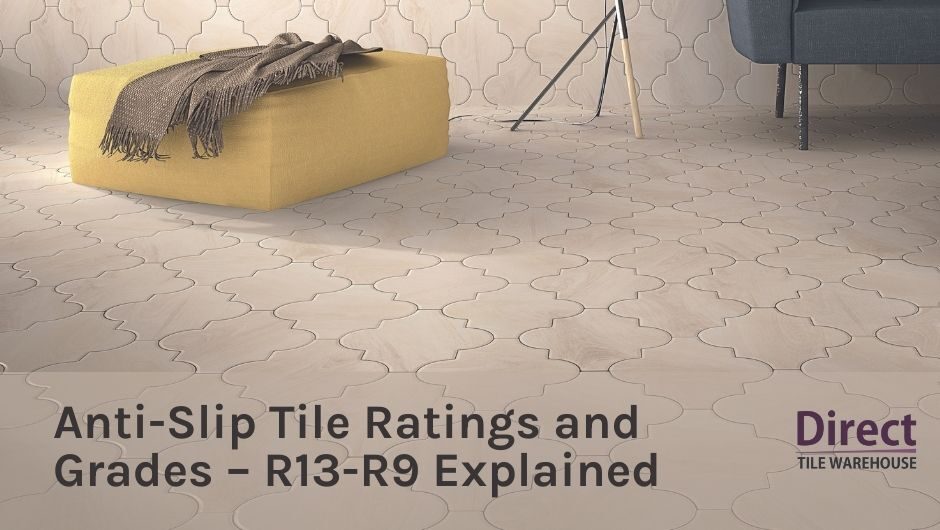When browsing for tiles you’ll likely come across the “R” rating system. This is the letter R followed by a number (12, 11, 10 or 9). But what do anti-slip tile ratings and grades mean, and how can they assist you in purchasing the right tiles to suit your needs?
In this blog, we’ll explain anti-slip tile ratings and grades, suggest where each rating can be used, and even give examples of R9-R12 tiles so that you know what’s currently available to purchase.
See the latest anti slip tiles.
Anti-Slip Tile Ratings and Grades – R12-R9 Explained
The ‘R’ rating system indicates an anti-slip finish. This letter and number combination indicates the level of the anti-slip finish. Not all tiles have anti-slip tile ratings, but tiles that have been designed to provide grip often will. The ‘R’ stands for ‘ramp test’, with the subsequent number indicating its anti-slip grade – 12 being strong, 9 being slight.
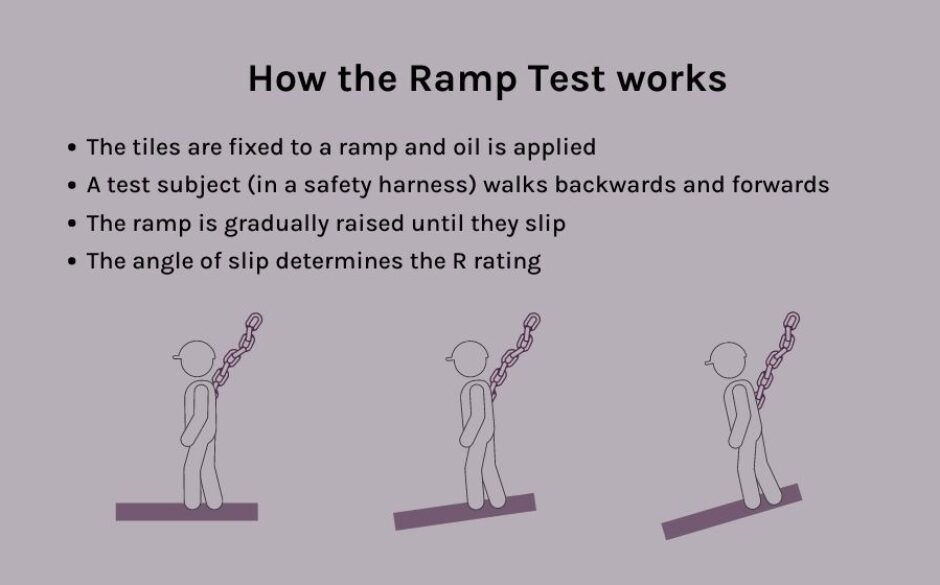
R12 Non-Slip Tiles
This anti-slip tile ratings category includes most unglazed tiles and some glazed ones, and is generally regarded as safe for installation in areas such as kitchens, bathrooms and hallways, as well as commercial areas of various sizes, from communal showers and lavatories, poolsides and changing rooms to hotel foyers, shopping centres and airports.
DOs: Use tiles made from porcelain both outdoors and indoors as a sturdy flooring option for areas where you’re looking to create a seamless kitchen-to-patio or garden transition.
DON’Ts: Don’t rely on R12 tiles to prevent slipping if used on excessively steep slopes. If you’re tiling a commercial space and want to protect yourself against injury claims, opting for R13 tiles is the safest option.
Example Product: A bestseller for commercial areas, the Dotti Corund range has an R12 slip resistant rating and is ideal as non-slip floor tiles in places like commercial kitchens and storerooms. These non-slip porcelain tiles are also suitable for external situations.
Shop our tiles with R12 anti-slip tile ratings here.
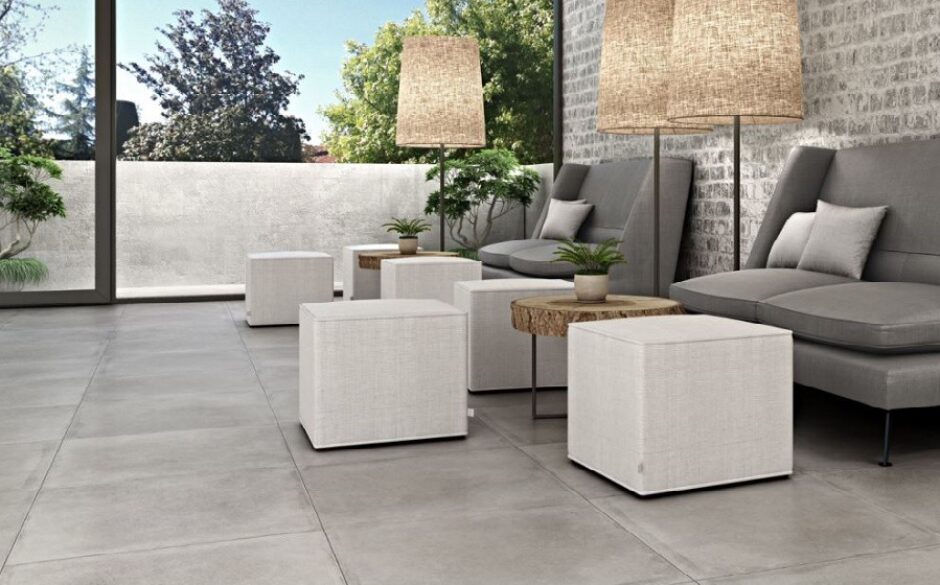
Camous White Anti Slip Floor Tiles
R11 Anti-Slip Tiles
Similarly to the R12, floor tiles in the R11 anti-slip tile ratings category are considered to be secure for both dry and wet environments, which makes them perfect for use in home environments varying from damper areas such as bathrooms and kitchens, to hallways and even living rooms.
You should also consider having R11 tiles if you are installing office floors, as they are both hardwearing, saving you money on floor replacements, and sturdy, saving you money on minor injury claims.
DOs: Make the most of the textured anti-slip finish and create beautiful (and safe!) outdoor areas throughout your patio and garden.
DON’Ts: Don’t go below R11 if you are tiling wet rooms, as they might be unsafe to walk on barefoot in the presence of water and soap.
Shop our tiles with R11 anti-slip tile ratings here.
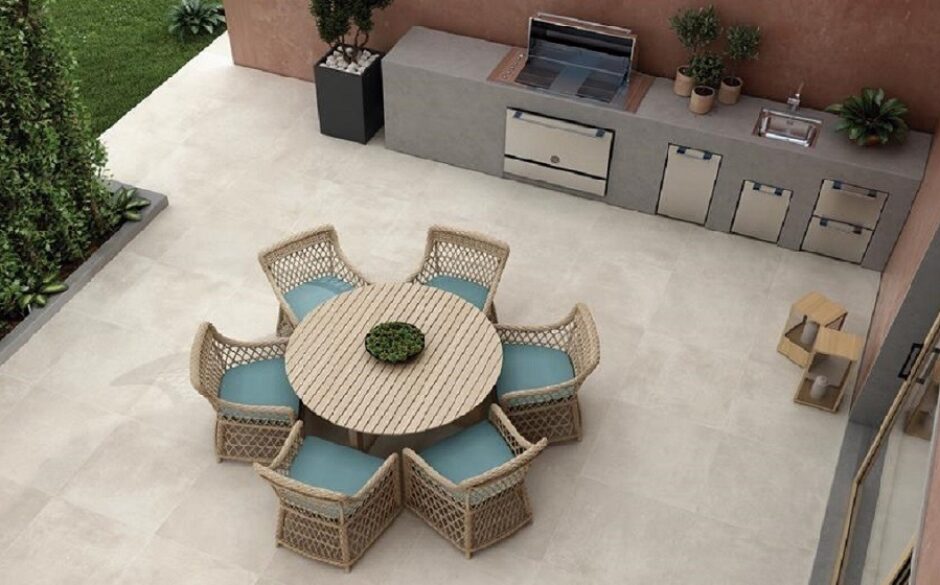
Rodano tiles
Example Product: The Rodano range of grey anti-slip tiles made from quality porcelain and ideal both for busy family homes and for some commercial environments. The R11 rated tiles are also suitable as exterior floor tiles if you want to add a stylish contemporary touch to our outdoor spaces.
R10 Anti-Slip Tiles
Often used to prevent slippage in domestic situations, anti-slip tile ratings of R10 will be perfect for kitchens and bathrooms. Thanks to their anti-slip properties, they can also be used as external floor tiles (porcelain versions only) or commercial tiles.
While R10 rated tiles will usually be glazed matt tiles which will act as anti-slip when wet, you might also find some unglazed tiles in this grade. In addition to bathrooms (where they should be used in combination with a bathmat) and kitchens, R10 tiles are also a good fit for living rooms and hallways, where occasional spills and wetness can occur.
DOs: Install in internal domestic settings where the floors are subjected to occasional wetting such as bathrooms, utility rooms and kitchens.
DON’Ts: Don’t be tempted to use these as a cheaper option in areas where increased friction and high slip resistance is required.
Shop our tiles with R10 anti-slip tile ratings here.
R9 Slip Resistant Tiles
The R9 tiles exhibit a lower amount of anti-slip properties compared to higher anti-slip tile ratings and grades. R9 is the lowest of the anti-slip tile ratings, meaning they are fine for domestic environments and if they are made of porcelain, some commercial environments where anti-slip properties are not really required.
Full-body porcelain tiles like the Dotti R9 is very popular for newsagents, car showrooms and shops. Quarry tiles can be used outdoors, because of their construction and frost resistant properties, but care needs to be taken when wet.
DOs: Use in dry areas where the floors are rarely, if ever, exposed to water, such as dining areas and hallways.
DON’Ts: Ideally, R9 tiles should not be used outdoors or in wet environments.
Shop our tiles with R9 anti-slip tile ratings here
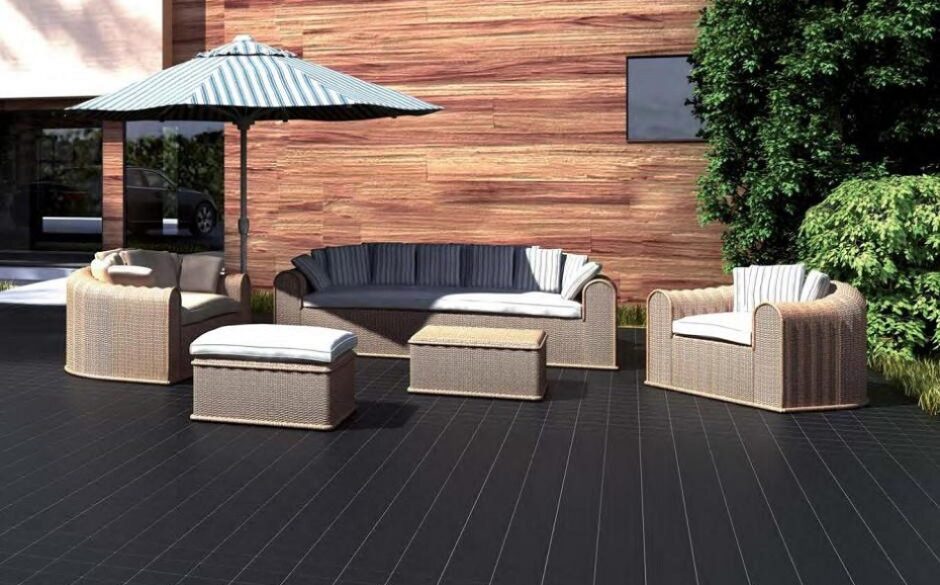
Spanish Quarry Tiles
Example Product: Our range of quality quarry tiles is perfect for use in bathrooms, kitchens and hallways, provided that there’s minimal exposure to water. Great in both interior and exterior spaces, or even as commercial tiles, thanks to their hardwearing finish.
View our R9 graded tiles.
What is a PEI rating?
You may also have seen a rating called PEI. This is a measurement carried out to standards set by the Porcelain Enamel Institute (PEI) carried out by machines that mimic different levels of footfall and traffic. The tile’s resistance to abrasion is then rated from 1-5.
PEI 0 – Wall tiles only
Tiles with this rating are only suitable for use on walls and kept high and dry.
PEI 1 – Light Footfall
These tiles can be used on walls and worktops, along with floors that don’t have a frequent footfall, such as bedrooms and ensuite bathrooms. And ideally, you’d only wear softer footwear such as slippers.
PEI 2 – Moderate Footfall
PEI 2 tiles can be used in less busy areas of the home, such as bathrooms.
PEI 3 – Regular Footfall
These tiles can be used throughout the home including busy areas such as hallways, living spaces and kitchens.
PEI 4 – Intense Footfall
The tiles are suitable for use throughout the home and also in ‘light’ commercial areas such as offices, bars or restaurants.
PEI 5 – Heavy Footfall
These are very tough tiles, so they can withstand the high footfall of busy public areas such as airports and shopping centres.
Just to note: the PEI rating does not take into consideration the thickness of the tile. Don’t assume that a tile is harder wearing because it is thicker – check the PEI rating for durability.
We hope that this post has helped to explain anti-slip tile ratings and grades. If you need more expert advice on which anti-slip rating is best suited for the different areas of your home, get in touch and our team would be happy to help you find the perfect fit.


